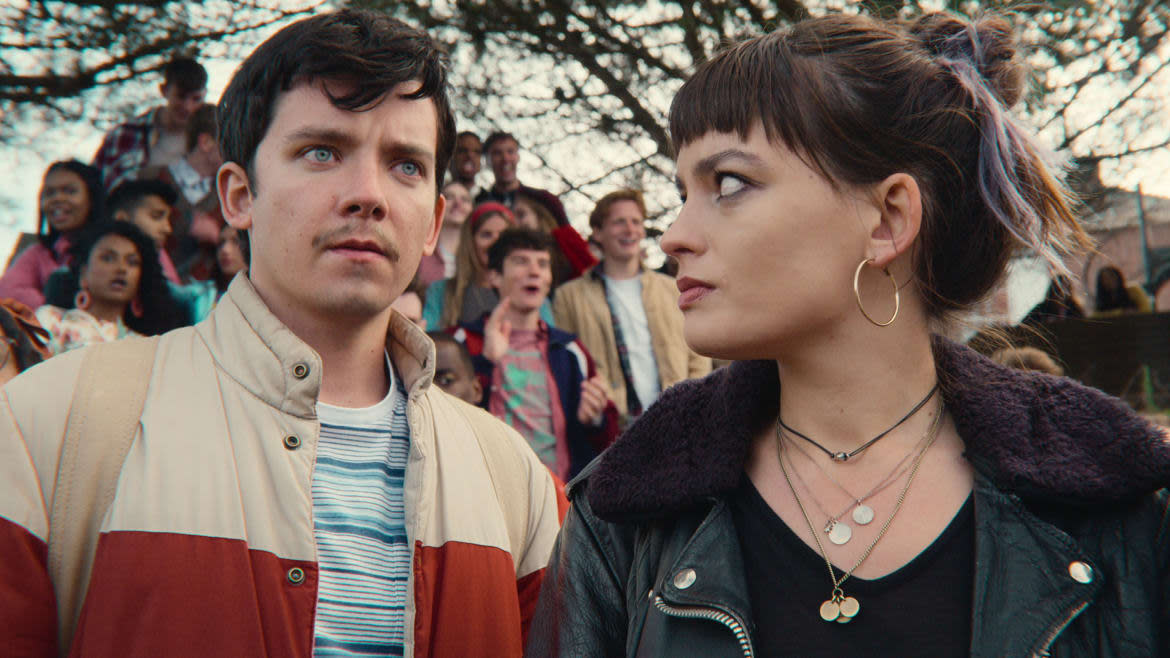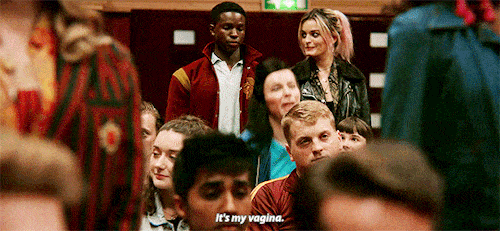Netflix’s ‘Sex Education’ Is the Best Show on TV Right Now

I have long given up on ever understanding what you all binge on Netflix, let alone how you find it.
A TV series with the worst reviews of the year? No. 1 in the streamer’s Top 10 for at least a month. A movie that had no marketing, no press, and that I, a person who works as a professional entertainment journalist, had never even heard of? Somehow it ranks among the most-watched movies of the year.
But once in a while—very rarely—I am proud of you. My heart is full seeing that Sex Education’s third season has been hovering at the top of the Netflix Top 10 all week, a welcome example of adoring word of mouth finally materializing as worthy mainstream chatter. Oh, and you all actually listening and watching something good.
It’s been one of my favorite shows on television since it premiered in 2019, and I think has been underrated and under-discussed. It’s definitely the best series on Netflix right now, and probably the best season of TV to premiere this month.
Maybe the title scared some people off, or made them think that it was something that it’s not. It’s not preachy, didactic, or patronizing about sex and sexual health. It’s not trolling and out to shock you with horror stories about what teens these days are doing (a la Euphoria), or meant to titillate you in a sort-of perverse way (like the Gossip Girl reboot).
It’s heartfelt and it’s humorous, both heightened and real. It acknowledges the harsh truths and pains of growing up amidst modern sensibilities—which is to say, hysteria and confusion—about identity, sex, and sexuality. But for all the ugliness it unearths about the human condition, the series somehow still manages to make you feel good.
Sex Education is set in a rural British town where all the teens, no matter their economic or cultural backgrounds, all attend the same academy.
Otis (Asa Butterfield) is a familiar teen character: the lanky, bumbling, awkward kid who—while, let’s face it, is completely normal—is still looked at as odd by the popular kids. His mother, Gillian Anderson’s Jean, is a renowned sex therapist, and, while that makes for an odd dynamic between parent and child, Otis has retained some of her attitudes and wisdom through osmosis.
Through a series of events over the first two seasons, that manifests itself in an underground sex-advice clinic that Otis operates at the school, despite not having much sexual experience himself and learning his way through hormones, relationships, and sexual proclivity.
The clinic is a clever narrative for introducing a sprawling cast of supporting characters and their respective hang-ups, inviting viewers in for a validating round of “I feel like that, too!” Or, for us old folks, “I definitely once felt like that.”
Ncuti Gatwa’s Eric and Connor Swindells’ Adam are coming out of the closet and into a space of pride at very different paces and levels of expression. Aimee Lou Wood’s Aimee works through being dismissed as a pretty ditz and having people take her intimacy issues seriously after a trauma. Tanya Reynolds’ Lily fears that letting her freak flag fly may ruin any promise of being loved for who she is. And then there’s Emma Mackey’s Maeve, so mature and so jaded, wearing the burden of the world on her shoulders, a weight that buries any assertion that she might deserve happiness, too.
Obviously, sex is a major element of the show. But it’s subversive, not horny or salacious. It’s about how anxieties, misconceptions, and, to riff on the title, bad education can be irreparably damaging, particularly in such formative years.
Practically since TV began, whenever there was a teenage-focused show that involved sex in any frank or, lately, gratuitous manner, there is a wave of celebration and excitement, and then the counterblast of condemnation, pearl-clutching, and moaning about the decline of decency.
Sex Education pierces through both sides of the argument by being, in a way that is almost rather cheeky, about the birds and the bees conversation more so than the sex itself. It’s inquisitive, curious, and a little rebellious about it, because that’s what teenagers are. But it’s also informative, progressive, and empathetic, because that’s what they need. Truthfully, what we all need.
That’s a more academic reason why what the show pulls off is so impressive. But it’s also about feelings. It’s a show that just feels nice.
I know that’s a trigger word these days, with people turning against Ted Lasso or groaning about the continued popularity of Schitt’s Creek as naivete while the world continues to burn. But maybe because you can’t really lump a show that has sex in the title into an argument against gee-golly goodness, Sex Education escapes much of that discourse.

It’s a warm series, which is surprising in its own right. Ordinarily, watching teenagers navigate the absolute hell of those years makes your skin crawl while you hide your eyes in second-hand embarrassment. But there’s a grace with which these characters are treated. After three seasons, there’s also an assumption that, while the bullshit life throws at them is tough, cruel, and painful, they’ll be OK, even if emotionally bruised. (Ain’t that life?)
There’s so much nostalgia, which is to be expected if you are an adult watching a bunch of kids figure out high school. But that’s also owed to the bizarre aesthetic, which may be my favorite thing about the series. Everything from the costuming to the set design to the music choices make you feel like the show is set in the ’90s. Even the beats of the storylines kind of evoke familiar ones from ’90s rom-coms and teen comedies. But it does take place in 2021, in the age of iPhones.
‘Alter Ego’ Is the Most Dystopian Reality Competition Yet
Never is that more clear than when the tyrannical new head teacher, played by Jemima Kirke (who gives a sensational performance), is brought in to throw the school’s sex-positivity under a cold shower. She admonishes the students for demanding that they be seen for who they are—their identities, their concerns, their mental-health issues—calling them “snowflakes” and proclaiming that the worst part of their generation is that they think they’re special.
What is more modern than the false promise of acceptance and empathy, and the backlash pushing things backwards after progress starts to be made?
It’s a lovely show. It’s a weird show. It can be prickly. For all the fun of it and the “niceness,” it viscerally captures how lonely being misunderstood and not validated can be, especially at that age.
It’s so good, and I’m so glad we’re finally saying it.
Get our top stories in your inbox every day. Sign up now!
Daily Beast Membership: Beast Inside goes deeper on the stories that matter to you. Learn more.

 Yahoo Movies
Yahoo Movies 
